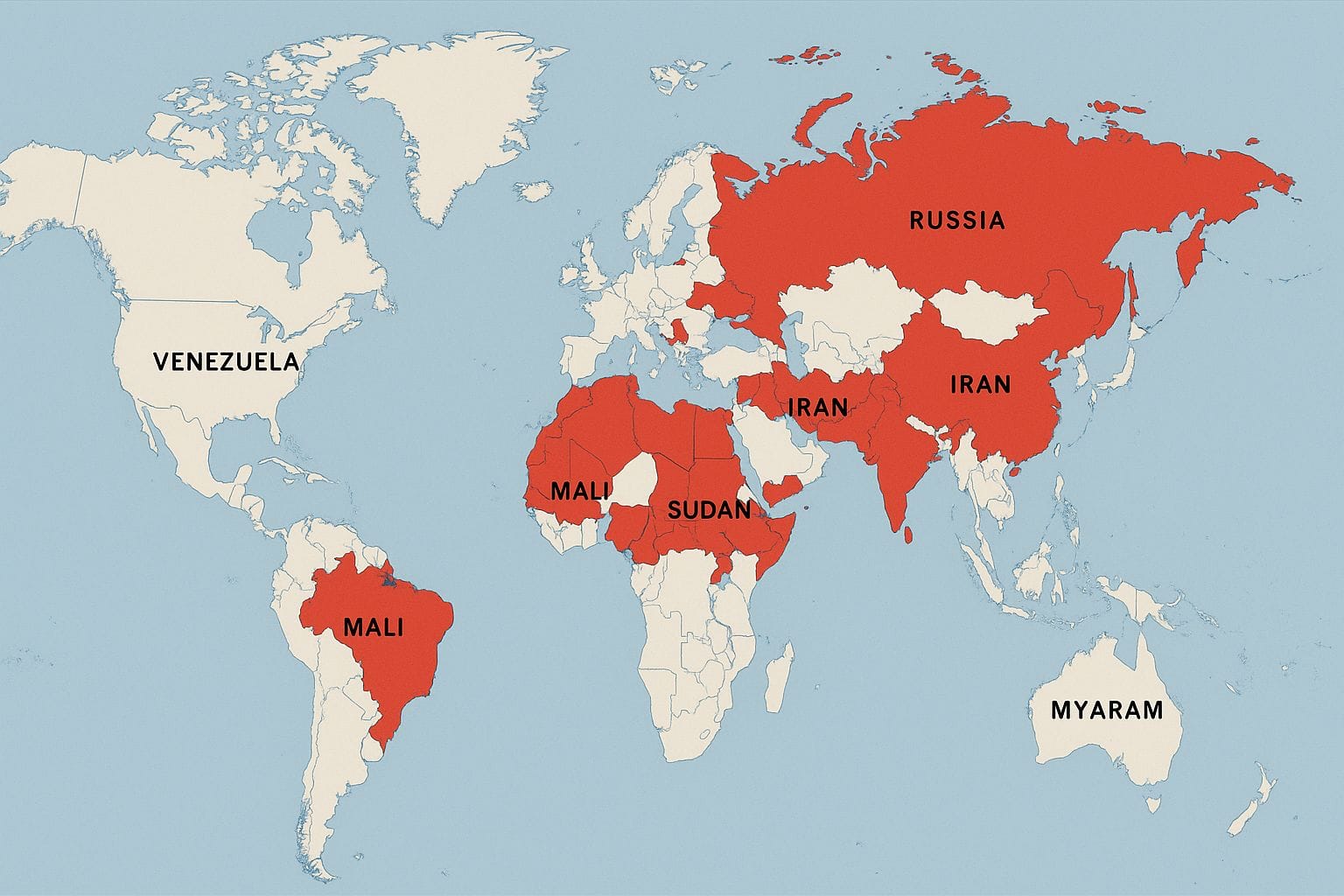Australia Expands “Do Not Travel” Advisory List: Mali Joins Global Hotspots as Security Deteriorates
CANBERRA, Australia — July 2, 2025 — The Australian Government has officially added Mali to its highest-level “Do Not Travel” advisory, placing the West African nation alongside countries such as Russia, Venezuela, Iran, Sudan, Myanmar, Belarus, and Iraq. The decision underscores a growing wave of global insecurity, ranging from terrorism and civil unrest to arbitrary detention and collapsed infrastructure.
Issued by Australia’s Department of Foreign Affairs and Trade (DFAT) through its Smartraveller platform, the advisory serves as a critical warning for citizens about life-threatening risks in regions increasingly destabilized by war, violence, and failed governance.
Mali: Rising Terror Threats and Lawlessness
Mali’s inclusion on Australia’s Do Not Travel list follows a troubling surge in extremist violence and widespread political instability. Terrorist attacks have intensified across the country, including in the capital, Bamako. Armed insurgent groups now operate freely in areas once deemed relatively safe, posing a heightened threat to foreigners.
Foreign nationals, particularly those involved in mining or humanitarian aid, are at increased risk of kidnapping or targeted assaults. Australian authorities have also warned that legal protections are minimal in Mali, with travelers facing the possibility of arbitrary detention or severe penalties under local law.
Given the lack of Australian consular presence in Mali, citizens are urged to leave the country immediately if it is safe to do so and to avoid any future travel to the region.
Russia: Arbitrary Detention and Conflict Zones
Russia remains a high-risk destination on Australia’s travel radar due to sustained military operations, political repression, and the risk of arbitrary arrest. Australians, especially those holding dual citizenship, are cautioned about being surveilled or detained without cause.
Ongoing military activity in the western border regions and a string of terrorist attacks, including the March 2024 Crocus City Hall shooting and the 2023 Dagestan bombings, highlight the unpredictability of the security environment. The Australian Government advises its nationals to exit Russia while commercial routes remain open, as airspace and border controls can change without notice.
Venezuela: Political Breakdown and Violent Crime
Venezuela has seen rapid socio-economic decline, with violent protests, kidnappings, and the collapse of public services becoming commonplace. Australians in Venezuela face difficulties accessing basic necessities such as fuel, food, and medicine, and are at risk of being caught in violent confrontations or detained without due process.
The absence of functioning consular services further complicates the situation for foreign nationals. DFAT recommends immediate departure for any Australians still in Venezuela, particularly through major urban centers like Caracas, where commercial flight options are still available.
Iran: Diplomatic Freeze and Arbitrary Arrests
With the Australian Embassy in Tehran now closed, consular support is almost non-existent. Australia has cited an alarming increase in the detention of dual nationals and politically motivated arrests. Travel across Iran is also complicated by periodic protests and an unpredictable security environment.
Australians are advised to avoid all gatherings, stay away from known protest locations, and depart via functioning airports in cities such as Mashhad while commercial services are operational.
Sudan and Myanmar: Civil War and Collapse
Sudan remains a no-go zone due to its civil war, particularly in conflict-ridden areas like Khartoum and Darfur. Infrastructure collapse has left millions without access to medical services, clean water, or electricity. The risk of kidnapping and terrorist activity is also pronounced.
Myanmar, meanwhile, continues to reel from a deadly combination of post-earthquake disruption and civil unrest. With armed clashes escalating across cities like Yangon and Mandalay, and reports of human trafficking involving foreign nationals, Australia advises its citizens to avoid the country altogether.
Belarus and Iraq: Authoritarian Crackdowns and Terrorist Activity
Belarus faces ongoing scrutiny due to its close ties to the war in Ukraine and internal repression. Australia warns that travelers may face charges for social media activity or expressing dissent. Additionally, dual nationals may not be recognized as Australian by Belarusian authorities.
Iraq, long fraught with instability, continues to experience regular bombings and militant attacks. The U.S. Embassy recently warned of increased risk to foreign visitors in Baghdad, Mosul, and surrounding areas. Australians in Iraq are urged to depart without delay.
Why These Warnings Are Critical
The expansion of Australia’s Do Not Travel list reflects an urgent reassessment of global risk. As DFAT explains, these warnings are not symbolic; they are issued when threats to life, liberty, and safety are imminent, and when consular support is unlikely to be provided in a crisis.
Travelers in any listed country are urged to register with Smartraveller (smartraveller.gov.au), monitor local developments, and prepare for emergency departure options. In many of these regions, even exit routes are vulnerable to closure or control by hostile forces.
Global Travel Outlook: Proceed With Caution
As geopolitical instability spreads across multiple continents, the number of countries flagged under Australia’s highest-level advisory has grown. Citizens are reminded that travel to these destinations carries immense personal risk and that government evacuation may not be possible.
Whether due to terrorism, political unrest, or natural disaster, the safety of Australians abroad remains a top priority for DFAT. Travelers are encouraged to conduct thorough risk assessments before departure, avoid unnecessary travel to high-risk zones, and remain informed through official government platforms.
For more travel news like this, keep reading Global Travel Wire
















